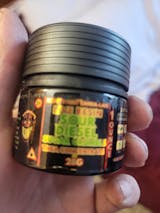Another favorite,they are all my favorites. Unique to its own taste and high, it's awesome,like all their products.Buy it,try it.youll like it
This is my favorite strain, the taste is amazing. It is super potent. And, it's an OUNCE.
This product like all the others is amazing. Strong!! 💪
The price was good and the shipping speed was excellent. Product is a bit more dry than any sugar that I've ever seen. Smells great. Tastes like your dabbing gym socks. The flavor is horrendous. I don't know if there's any real affect because I have a high tolerance and cannot stomach enough to find out.
First order from CHC, nice buds, they smack! break down nice and smoke good







